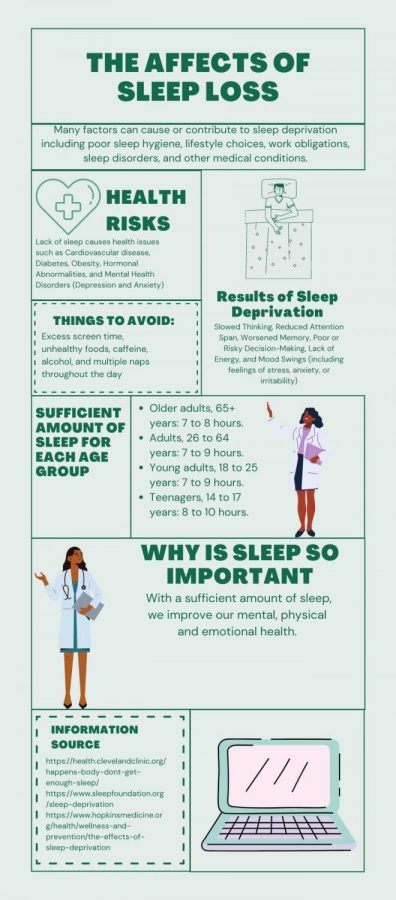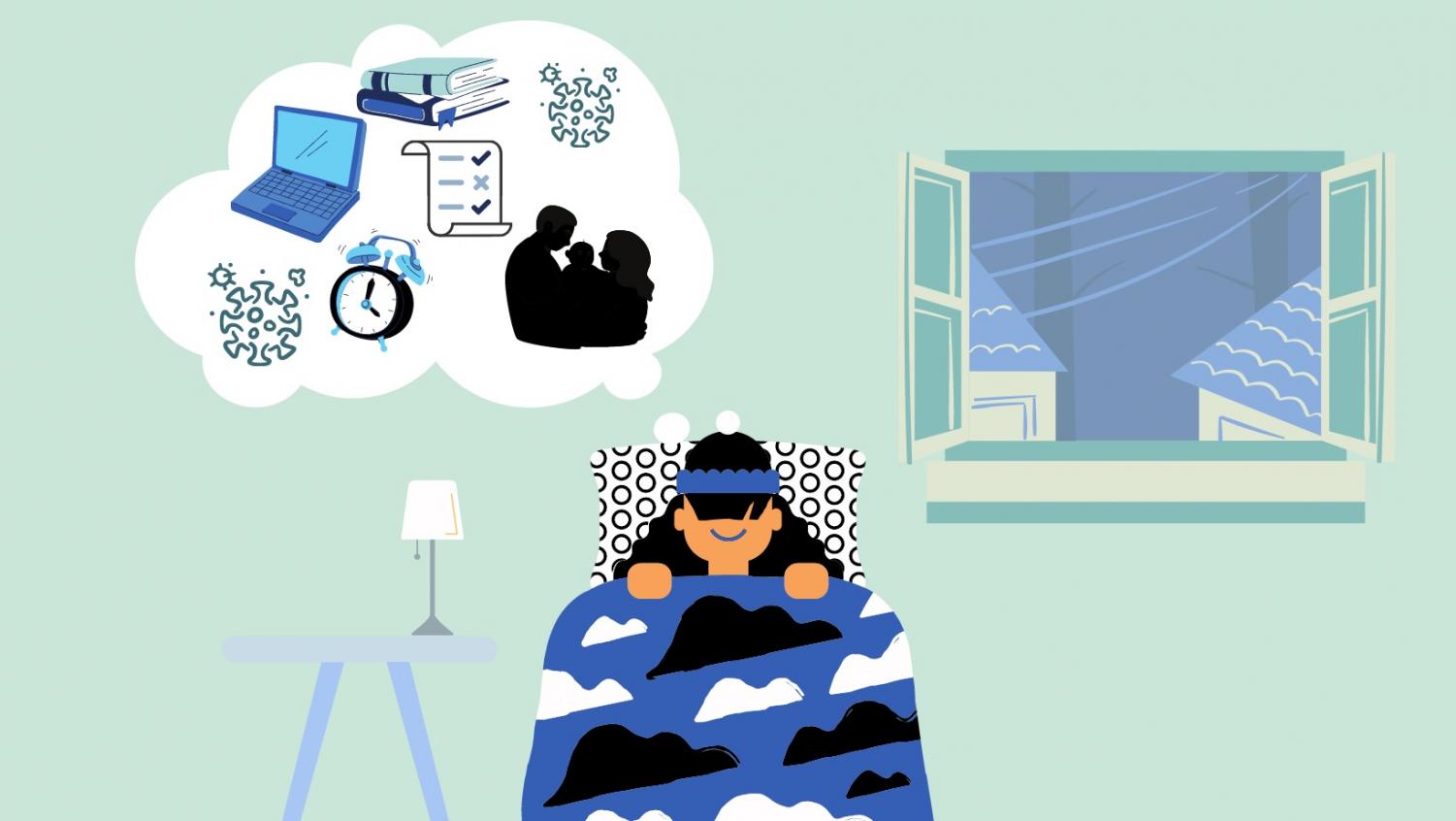COVID 19: Sleeping Through the Storm
April 27, 2021
The coronavirus (COVID-19) plays a major role in changing the lives of the American people. Whether a family member passed away, a job was lost, or an event was canceled, almost everyone’s life has changed. According to the American Academy of Sleep Medicine,, children ages 6 to 12 should sleep from nine to 12 hours per day and teenagers 13 to 18 should sleep eight to 10 hours.

With students not attending school in person, sleeping habits changed drastically. Instead of worrying about attending physical classes, interacting with peers and educators, and traveling to and from school, students get a more relaxed educational experience. Depression due to isolation, anxiety, and fear surrounding the pandemic may also contribute to the change in students’ sleep schedules.
“Even though we are living through this incredibly stressful time, which is changing our behaviors drastically, we are seeing changes to sleep behaviors that are for the most part positive,” said lead author Ken Wright, a professor of integrative physiology at CU Boulder and director of the university’s Sleep and Chronobiology Laboratory.
According to Boulder’s Sleep and ChronoBiology Laboratory, after the stay-at-home orders went into effect, 92 percent of students received the recommended seven hours or more of sleep per night, up from 84 percent before. This means that the pandemic allowed students to receive much more sleep than before.
In comparison, from February 2020 to June 2020 students went to bed about 50 minutes later during the week and 25 minutes later during the weekend and woke up later, too. The researchers discovered that, on average, the students devoted 30 more minutes per weekday and 24 more minutes per weekend to sleep.
Getting an adequate amount of sleep contains multiple health benefits such as perception and memory, it promotes learning, recharges our mental and physical batteries, and generally helps us make the most out of our days. With a sufficient amount of sleep, we improve our mental, physical and emotional health. It improves mental health by keeping people sensible and prepared throughout the day. Sleep improves physical health by allowing one to rest their body and regain strength after difficult or even easy tasks. It improves emotional health by promoting positive moods as opposed to anger and irritability.
However, people cope with sleep loss in a plethora of ways. Creating a proper sleep schedule, avoiding unhealthy sugar and caffeine, and staying active all help fight sleep loss. Instead of drinking coffee, drink herbal teas and instead of going to sleep late, make a schedule for bedtime. Before bed, creating a sleep-inducing resting space, relaxation techniques, and avoid staying in bed after you wake up. People should take into account how getting an adequate amount of sleep benefits daily life.
“The pandemic is having a diverse impact on people’s sleep, with clinically meaningful sleep difficulties having undergone a sharp increase. We found that half of our participants showed signs of serious sleep problems during the pandemic. Specifically, we identified three different profiles of sleep changes: those who sleep more; those whose sleep schedule was pushed to later bed and wake-up times; and those who are getting less sleep than they did before the pandemic.” said Rebecca Robillard of Sleep Laboratory of the School of Psychology.
The group of students who acquire a low amount of sleep due to COVID-19 become depressed and anxious. According to sleep.org, those with insomnia develop depression much more often compared with those who sleep well. Anxiety also plays a role in losing sleep. Sleep deprivation can worsen anxiety, which creates a negative cycle involving insomnia and anxiety disorders. Anxiety disorders include panic disorder (sudden fear causing a panic attack), social anxiety disorder (feeling overwhelmed with worry and self-awareness in normal situations), separation anxiety (feeling anxious and nervous when separated from a loved one), as well as selective mutism (feeling comfortable communicating with loved ones but not with the general public).
According to an internet survey of 195 students, 71 percent showed increased stress and anxiety due to COVID. Surveyors identified multiple stressors that contributed to the increased levels of stress, anxiety, and depressive thoughts among students. These included fear and worry about their own health and of their loved ones. 91 percent of the group reported negative impacts of the pandemic, as well as 89 percent, reported difficulty concentrating on their studies (46 percent of this group had trouble focusing at home). 86 percent reported disruptions to sleeping patterns and loneliness due to social distancing (38 percent of this group showed their concern about returning to online classes) and 82 percent of the students showed a large amount of concern about academic performance. To cope with stress and anxiety, these students looked to support by adopting both negative and positive coping mechanisms.
“COVID-19 messed up my sleep schedule a lot. I either go to bed and wake up super early or super late. It’s also very inconsistent, so that’s a struggle as well. I fix it then it goes back.“ said Magnet sophomore Allyson Kirksey.
The pandemic displays both positive and negative outcomes when it comes to student sleep patterns. Some students saw improvements in their sleep schedule while others’ worsened. From an increased amount of sleep to mental health concerns COVID-19 invokes a number of issues. Although the pandemic may cause a plethora of issues, good or bad, everyone must learn to cope in their own way.

Cheryl Colin • Apr 27, 2021 at 12:42 PM
Hello, I’m a 65 year old very active senior, I enjoyed reading the report and it was enlightening as well as informative, We have all adjusted our sleep patterns for sure. Personally for my husband and I, although retired and a lot of times 😩 tired, we just nap at any hour of the day, I call them my getting powered up for an outing nap. The writer absolutely touched on all points to make sure mom or dad knows for sure that as teenagers they must allow us to get all our 😴 in in order to be physically and mentally focused for a productive day! My opinion and mine alone.